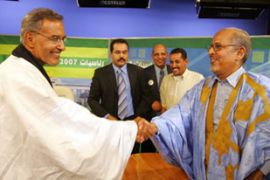Mauritanian run-off vote ends
Election officials report lower than expected turn out as ballot counting begins.

Abdallahi is supported by a powerful coalition of 18 political groups once loyal to Maaouiya Ould Taya, who seized power in 1984 and ruled for 20 years.
Daddah, an ardent critic of Taya, was minister of finance when his half brother Moktar Ould Daddah, the country’s first post-independence leader, was in office.
Abdallahi won 25 per cent of the vote in the first round of the election, while Daddah finished with 21 per cent.
On Friday, Abdallahi said because his coalition has a majority in parliament, he would be able to accomplish things more quickly.
“We can move the country forward with the largest coalition possible,” he said, presenting himself as the consensus candidate.
Daddah spoke about not returning to the past, denouncing “groups who looted the country for 20 years and want to continue to do it”.
“But a new hope is born,” he added.
Both candidates have said they will review the country’s diplomatic ties with Israel and have pledged cautious co-operation with the the US “war against terrorism”.